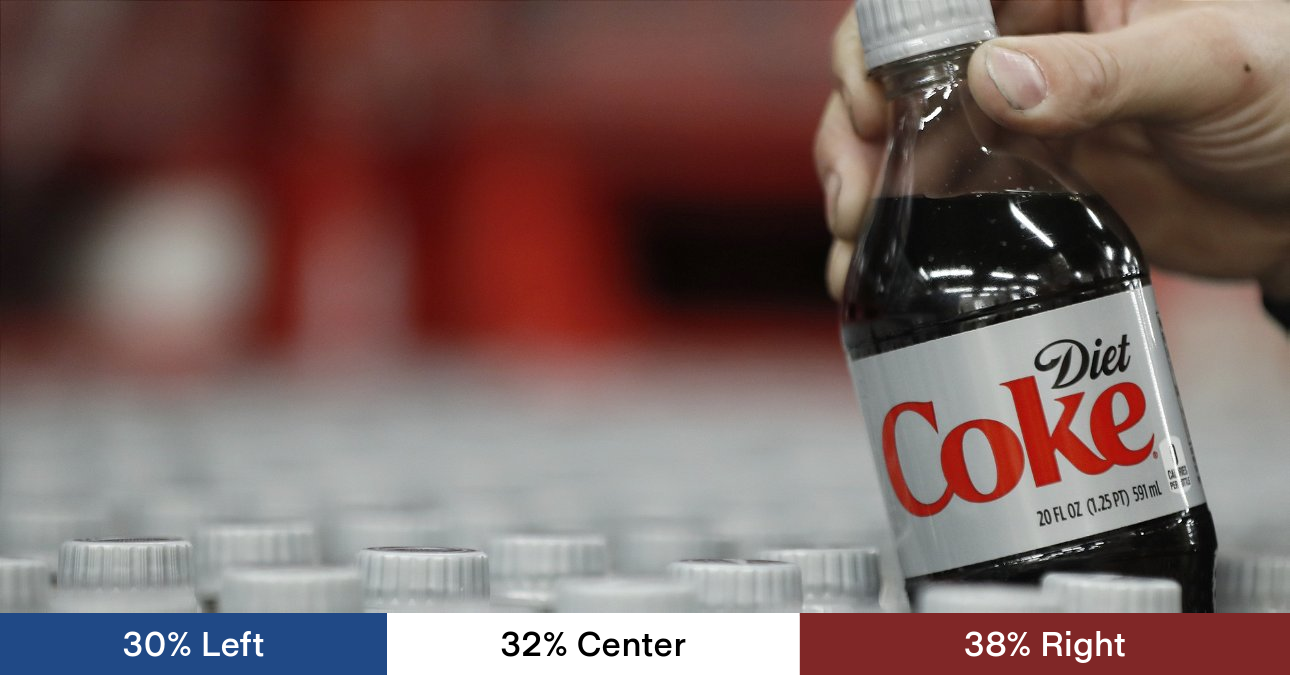Aspartame is also linked in some studies to weight gain, GI disorders, mental health issues and more:
According to some studies, aspartame and other artificial sweeteners can lead to weight gain instead of weight loss 12. Aspartame has been linked to increased appetite, diabetes, metabolic derangement and obesity-related diseases 2.
One study showed that aspartame causes greater weight gain than a diet with the same calorie intake but no aspartame 1. Another study found that even acceptable daily intakes of aspartame might make you hungrier and lead to weight gain 3.
…some research suggests an association between aspartame intake and metabolic damage to the central nervous system (CNS), such as changes in enzyme and neurotransmitter activities 2. Aspartame acts as a chemical stressor by elevating plasma cortisol levels and causing the production of excess free radicals. High cortisol levels and excess free radicals may increase the brain’s vulnerability to oxidative stress which may have adverse effects on neurobehavioral health 3.
There is also some evidence that high-aspartame consumption may lead to weaker spatial orientation, irritability, depression, and other neurobehavioral conditions 14. However, these studies are limited in scope and further research is needed to determine the long-term effects of aspartame on human health.
Worth researching more, especially if you eat/drink anything with this stuff - and it’s in a lot of food products.
deleted by creator
I’m convinced that sugar companies pump bullshit about other sweeteners to sell more sugar in America.
Like we already have sugar in fucking everything, you don’t need to ALSO propagandize the stupidest and most propagandized people in the first world.
I’m so happy that I’m able to make a lot of things that my family eats from scratch. Bread does not need sugar/HFCS in it to be tasty! Really the only things I buy pre made now is pasta (I’m learning how to make spaghetti noodles, but elbow noodles remain elusive lol).
Yeah, the bread one annoys me. The homemade bread me and my dad make tastes 100 times better that store bought, and we don’t put sugar in it.
It’s just a fucking scam man. I’m glad I live in Canada where it’s slightly better, but not by much.
You can see why Americans struggle so hard with weight issues though.
We actually don’t have much in the way of sugar. Usually high fructose corn syrup is the substitute in the US, since the government subsidizes corn production. High fructose corn syrup (obviously) comes from corn, so it’s cheaper than sugar due to those government corn subsidies - meaning that not a lot of American food has sugar in it.
HFCS and sugar are almost identical, to the point where it’s not worth distinguishing from a nutritious standpoint, or in the context of what I’m trying to say here.
Um. Just to point out a couple of things here:
“According to ISA, aspartame is one of the most-thoroughly researched ingredients in history…”
ISA is the International Sweeteners Association. I hope that speaks for itself?
And that the International Council of Beverages Association would defend it is similarly unsurprising, as they have a vested interest.
You are minimizing a WHO body with industry shill talking points and people are upvoting it because it sounds convincing.
While you are pointing out correct things, you are missing the forest for the trees.
Here is a better article: https://www.reuters.com/business/healthcare-pharmaceuticals/whos-cancer-research-agency-say-aspartame-sweetener-possible-carcinogen-sources-2023-06-29/
The IARC makes its carcinogenic categorizations mutually exclusive from dosing. If a substance is known to be carcinogenic at unrealistic amounts, it will still be labeled as carcinogenic. They don’t’ bring the human dosing element into play.
There is another WHO organization called the JEFCA that does actual food safety, with the context of a human being.
You’ve literally quoted two industry bodies who have a vested interest in keeping aspartame on the market.
https://pubmed.ncbi.nlm.nih.gov/28938797/ https://academic.oup.com/nutritionreviews/article/75/9/718/4101228
The existing animal studies and the limited human studies suggest that aspartame and its metabolites, whether consumed in quantities significantly higher than the recommended safe dosage or within recommended safe levels, may disrupt the oxidant/antioxidant balance, induce oxidative stress, and damage cell membrane integrity, potentially affecting a variety of cells and tissues and causing a deregulation of cellular function, ultimately leading to systemic inflammation.
There is controversy regarding how aspartame was passed as “safe” last century - essentially lobbying.
The lobbying pressure pro-aspartame is significant, due to the enormous sums - profit - involved.
CONCLUSION
Current scientific knowledge about the safety of aspartame, as reviewed here, is based mostly on animal studies. These studies suggest that aspartame, even at recommended safe dosages, might not be safe. Several of these studies (in vitro as well as in vivo) that investigated both higher and safe dosages indicate that aspartame or its metabolites cause an oxidant/antioxidant imbalance, induce oxidative stress, and damage membrane integrity (lipid, protein, and nucleic acid), possibly affecting most cells and tissues. Aspartame is directly involved in the development of oxidative stress, which is a hallmark of systemic inflammation (Figure 3). Several animal studies have also reported a deleterious effect of aspartame exposure on body weight, adiposity, and/or glucose tolerance and insulin levels. These are summarized in a 2016 review by Fowler.125 Thus, there is a need for additional detailed human studies and comprehensive characterizations of the physiological processes affected by aspartame. This is of particular importance, as diabetic and other individuals with gut dysbiosis may already be at increased risk of systemic inflammation because of the inflammatory nature of their conditions. Data reviewed in this paper suggest that aspartame use could not only exacerbate existing systemic inflammation but also cause inflammation if healthy individuals ingest it on a regular basis.
deleted by creator
As an MD, I don’t touch the stuff. But then I think this is a great channel: https://www.youtube.com/channel/UCddn8dUxYdgJz3Qr5mjADtA/videos
You go crazy if you want.
This is not even looking at the other issues with aspartame, including possible weight gain, exacerabtion of mental health issues:
According to some studies, aspartame and other artificial sweeteners can lead to weight gain instead of weight loss 12. Aspartame has been linked to increased appetite, diabetes, metabolic derangement and obesity-related diseases 2.
One study showed that aspartame causes greater weight gain than a diet with the same calorie intake but no aspartame 1. Another study found that even acceptable daily intakes of aspartame might make you hungrier and lead to weight gain 3.
. However, some research suggests an association between aspartame intake and metabolic damage to the central nervous system (CNS), such as changes in enzyme and neurotransmitter activities 2. Aspartame acts as a chemical stressor by elevating plasma cortisol levels and causing the production of excess free radicals. High cortisol levels and excess free radicals may increase the brain’s vulnerability to oxidative stress which may have adverse effects on neurobehavioral health 3.
There is also some evidence that high-aspartame consumption may lead to weaker spatial orientation, irritability, depression, and other neurobehavioral conditions 14. However, these studies are limited in scope and further research is needed to determine the long-term effects of aspartame on human health.
deleted by creator
Of course they don’t. Everyone wants RCT, but the money for RCTs is often found in big pharma, and they sure as hell don’t want to spend it on finding that very profitable food additives are disease inducing (though they may funnel money into studies that appear to show the opposite - you know this happens) or vitamins.
This is one of the reasons why you don’t find many good quality studies, including RCTs, for cheap, natural foods or supplements. Where’s the money in that?
Watch the first 2 minutes. https://www.youtube.com/watch?v=0smauGspMm4
This is all based on studies and evidence-based medicine.
RCT? That’s still Roller Coaster Tycoon to me.
Randomized Controlled Trial I think
Thanks!
It’s not this straight forward. I read the reuters article about this that goes into more detail.
But basically, IARC is only looking at if the substance can be carcinogenic, regardless of the quantity it takes for it to be harmful to humans.
There is another organization, called JECFA that is specifically for advice for individuals. This is where “food regulations” would come from.
The JECFA is set to show off their findings at the same time as IARC is gonna make their announcement. I feel like some of you guys are jumping the gun here due to the title of the articles coming out.
Click bait works, unfortunately.
Obesity is one of the leading preventable causes of cancer. Along with tobacco, alcohol, sun exposure, and red meat consumption. Aspartame is not a major cause of cancer in humans. If it helps you lose weight, then you’re improving your cancer risk.
If it helps you lose weight, sure, but I think there is more going on when you realize cancer risk down but mortality up…
Mortality
High consumption of artificially sweetened beverages was associated with a 12% higher risk of all-cause mortality and a 23% higher risk of cardiovascular disease (CVD) mortality in a 2021 meta-analysis.[64] A 2020 meta-analysis found a similar result, with the highest consuming group having a 13% higher risk of all-cause mortality and a 25% higher risk of CVD mortality.[65]Zhang YB, Jiang YW, Chen JX, Xia PF, Pan A (March 2021). “Association of Consumption of Sugar-Sweetened Beverages or Artificially Sweetened Beverages with Mortality: A Systematic Review and Dose-Response Meta-Analysis of Prospective Cohort Studies”. Advances in Nutrition. 12 (2): 374–383. doi:10.1093/advances/nmaa110. PMC 8009739. PMID 33786594.
I’m entertained by this sentence from your source (great source, by the way): “No significant associations were found for cancer mortality.” Lol
Also from your source, though, to dig deeper past the study title:
“Of note, participants in the highest levels of ASB intake were more likely to be overweight/obese, hypertensive, and hypercholesterolemic in most studies (8, 10, 11, 17, 28), and thus reverse causation was possible” meaning people already experiencing health-damaging overweight/obesity are also more likely to be replacing sugar-sweetened beverages (SSB) with artificially-sweetened beverages (ASB) which confounds the result that higher ASB intake is associated with higher all cause mortality. It may simply be that people who already had high mortality risk from their weight were also more likely to be consuming large amounts of ASB.
“Meta-analyses of randomized controlled trials found that low-calorie sweeteners modestly but significantly reduced body weight, BMI, fat mass, and waist circumference (23), but had no effects on blood glucose and blood lipids compared with saccharides (39)”
“Although biological mechanisms remain inconclusive, some studies indicated detrimental effects of low-calorie sweeteners on the regulatory mechanisms of appetite and satiety, release of gastrointestinal hormones, gastric motility, and balance and diversity of gut microbiota, which may further increase energy intake and disrupt blood glucose homeostasis (40). Taken together, ASBs might be optional alternatives for SSBs only when they are consumed in small quantities for weight management, and the long-term adverse associations of high amounts of ASBs with cardiometabolic diseases and mortality should be considered”
“Based on current evidence, SSB intakes should be avoided, and if ASBs are considered as optional alternatives for SSBs, they should be consumed in small quantities (i.e., <1.5 servings/d). Nevertheless, further high-quality studies are still warranted, particularly on the long-term impact of ASB intakes, because of limited studies and low-to-moderate quality of the current evidence.”
So overall, a little more nuanced and not quite the knock-out punch the study title might suggest.
Honestly nothing can be more dangerous than the OG coke. The amount of sugar in that can is incomprehensible
This is another point that no-one makes. While it is clear that the best alternative to a sweetened drink would be water, often it is the “healthier and natural” version with real sugar which is just incomparably more damaging to human bodies.
Barbecue sausages are also carcinogenic. What matters is how much and in what doses. Hey WHO: Show me scientific, peer revieved, reproduced in independed labs papers with solid proofs. Not preliminary results of “one research”. Then I will weigh pros and cons and decide if I should use it. Strangely decades of use under supervision of FDA and other reputable institutions had no remarks like WHO. Don’t forget that dihydrate monoxide also promote cancer, and we all drink it like water.
/edit typo, grammar/
https://www.cancer.org/cancer/risk-prevention/chemicals/aspartame.html
lol. The cancer folks think its fine.
Obesity is like the second biggest risk factor for cancers. This post reads like a non-medical professional’s interpretation of medical advice. I don’t mean to offend, because that is very common. But the information presented here is devoid of context in a way that makes it potentially misleading.
Gonna try to cut a line down the middle and say I’m not seeing very convincing evidence one way versus another. Lotta finger pointing and honestly getting way more intense about diet soda than I thought anyone would.
Gotta say that my family (and me until high school) drink wayyy to much diet soda. Like sugar, or aspartame it’s a bit worrying and when you drink caffeinated sweetness all day you’re probably going to feel defensive about someone saying it’s gonna kill you.
I am a bit of the mind that it may only be significantly carcinogenic at super high doses, but who knows if anyone is getting those doses either from commercial beverages or mixing it in the same proportions as sugar in their iced tea
Was going to say, I’m all for changing my habits/thought processes based on scientific data/evidence, but I could’ve sworn this debate has been raging on for some time now. First it was declared that it causes Cancer, then it was declared well no there’s not really enough evidence to support that, and now we’re back to it does. But I have yet to see a definitive link in any study and even this article says “possibly.”
Now, that being said I still avoid aspartame when possible, opting for Stevia whenever I have the choice. I just fear that this kind of back and forth tends to erode credibility through unsubstantiated whiplash with the general public.
As someone who would also very much like to believe that aspartame is perfectly safe, I will point out that in a controversy over “is this commercially sold product dangerous”, the side that says “no” is going to get a lot more funding than the one that says “yes”. Maybe there’s some potential financial incentive for alternative sweeteners to boost aspartame-bad studies, but the aspartame-good group is very directly backed by behemoths.
These things aren’t easy to prove and more research (from publicly funded sources) would be good, but when you’re seeing a lot of confusing competing claims, keep in mind that industry funded research exists and it will be overwhelmingly on the side of “let us keep selling these very profitable products”.
Wait… You mean to tell me that you don’t drink 100 Diet drinks at a time?
Sure, let’s wait and see what they say.
If you drink soda, do look more into the weight gain, GI issues and anxiety side effects from aspartame.
Possible carcinogen is an extremely low standard for the WHO, this probably means close to nothing
Or you will need extreme quantities for it to be something. But with that said, the few times my daughter get a soda I buy her a regular even if I drink with sweetener.
The sugar is much worse for her though.
Aspartame just like about anything is not good for you in large quantities. This probably doesn’t concern you if you just drink moderate amounts of sugar free drinks.
Except fo the links of aspartame to weight gain, GI disorders, anxiety and more.
Links or proofs?
I was about to admonish you asking for a link to a linked article, BUT the author linked to a link aggregator.
I went through all the linked article’s “abstracts.” Nothing.
I went through a few articles. Best I found was the WHO recommending an overall less sweet diet.
I tried to read it to figure out what the quantities that are dangerous are. Might be an idiot but I couldn’t find anything in the text that supported the title
Title of the document or title of this post?
And just to clarify, we’re looking for links to evidence that aspartame has an effect on “weight gain, GI disorders, anxiety and more.”
deleted by creator
Worth point out is that it doesn’t even reach the same classification as red meat which is classified as probably causing cancer.
theres a lot of things that MIGHT cause cancer i feel like if youre drinking enough diet coke to cause cancer its not the sweetener its your impulse control
I mean cancer is pretty much random… you can stand for 5 minutes in the sun and get skin cancer or spend 5 hours in a tanning machine and be fine (cancer wise). Doesn’t mean that going outside is dangerous or that tanning machines are safe.
I would seriously doubt any study that claims to have somehow controlled for everything so determine that red meat causes cancer. There are just way too many variables that would be contributing factors.
Even if there was a culture that ate zero meat ever, there would also be too many lifestyle differences for it to be red meat alone accounting for a decrease in cancer rates.
If anyone’s seen aspartame’s wikipedia article, it’s like the most corporate compromised entry I’ve seen. In fact this very report is already being covered up there.
deleted by creator
I sort of cringe (more of a nose wrinkle really) at OP’s “it’s known in some circles to be bad” You see beliefs and correlative evidence constantly misrepresented as proof and truth in food and medical science (reporting and discussion).
I get it. The body is a hugely complicated system, it’s hard to figure these things out. What does even figuring them out mean with the amount of complicating factors of this affects that which affects this which causes this.
I’m open to the idea that lobbying and such means Aspartame (and other industrial food products) has really been pushed through.
It’s also obviously been studied quite a bit and it’s hard to believe all the studies saying it’s safe at recommended levels are bunk or fraudulent.
This news was on another instance where the discussion included that the IARC carcinogen classifications do not take into account exposure/dosage. A whole bunch of things can be carcinogenic depending on exposure. Haven’t we all read how the rats that got cancer from saccharine had epic doses? It was just magnitudes more than a human would consume.
If an observational study won’t cut it (I see you, @xthedeerlordx, and appreciate your comment and explanation), how does one prove the causation? Don’t you need randomized controlled trials which would be extremely onerous controlling for various factors and basically making the (ideally large number of) participants live in a lab for whatever amount of time the study takes to really prove causation? I’d genuinely like to know. It seems like for a lot of things correlation after correlation after correlation is the best we’re going to get.
It’s going to be difficult to fund a large enough RCT to find a stat signif effect - it would be very expensive to follow people for 20-40 years and keep them in a study (10 000 people?). Similar to supplement studies - they may be effective, however big pharma won’t pay for RCTs for products that are already on the market and with little profit margin.
Unfortuantely, it’s not all 100% science - politics has a large hand to play here.
As I wrote elsewhere, there was one review showing potential biochemical and physiological mechanisms. It doesn’t prove anything, however due to the amount consumed, it is worth investigating further and keeping an open mind:
https://pubmed.ncbi.nlm.nih.gov/28938797/ https://academic.oup.com/nutritionreviews/article/75/9/718/4101228
CONCLUSION
Current scientific knowledge about the safety of aspartame, as reviewed here, is based mostly on animal studies. These studies suggest that aspartame, even at recommended safe dosages, might not be safe. Several of these studies (in vitro as well as in vivo) that investigated both higher and safe dosages indicate that aspartame or its metabolites cause an oxidant/antioxidant imbalance, induce oxidative stress, and damage membrane integrity (lipid, protein, and nucleic acid), possibly affecting most cells and tissues. Aspartame is directly involved in the development of oxidative stress, which is a hallmark of systemic inflammation (Figure 3). Several animal studies have also reported a deleterious effect of aspartame exposure on body weight, adiposity, and/or glucose tolerance and insulin levels. These are summarized in a 2016 review by Fowler.125 Thus, there is a need for additional detailed human studies and comprehensive characterizations of the physiological processes affected by aspartame. This is of particular importance, as diabetic and other individuals with gut dysbiosis may already be at increased risk of systemic inflammation because of the inflammatory nature of their conditions. Data reviewed in this paper suggest that aspartame use could not only exacerbate existing systemic inflammation but also cause inflammation if healthy individuals ingest it on a regular basis.
Full disclosure I’m going completely tangential for this one.
I find it believable at best that aspartame can cause cancer, but causing weight gain just makes no sense to me.
I used to be FAT. 250 lbs. I didn’t really make that many changes to my diet, except for cutting refined sugars way back.
I switched to Diet Coke, got off the little debbies, and I slimmed right down and now I’m hovering around 135.
It would make sense to say that I would maintain that weight or maybe gained more if aspartame was as harmful as this article says, but I’m not seeing it.
deleted by creator
Weight loss is not a single factor. No one will ever know what the actual causes for your weight loss are. It’s best to understand that anyone including you is just speculating.
"While aspartame is a low-calorie artificial sweetener that’s often used as a sugar substitute in diet drinks and “sugar-free” foods, there is some research suggesting that consuming artificial sweeteners might paradoxically lead to weight gain. However, the evidence is not definitive and the topic is controversial. Here are some proposed mechanisms:
-
Altered Metabolic Response: Some research suggests that artificial sweeteners may interfere with the body’s mechanisms for metabolizing sugar. Essentially, because your body expects sugar (and the corresponding calories) when it tastes something sweet, the consumption of low-calorie sweeteners may lead to increased food intake and a desire for sweet foods because your body is trying to get the calories it’s expecting.
-
Changes in Gut Bacteria: There’s also some evidence that artificial sweeteners, including aspartame, might alter the bacteria in the gut in a way that promotes weight gain and fat accumulation.
-
Increased Appetite: Some studies suggest that artificial sweeteners may increase appetite, leading to increased calorie consumption.
-
Psychological Factors: Some people may consciously or unconsciously consume more calories elsewhere in their diet because they believe they are “saving” calories by using artificial sweeteners."
I’d definitely buy the appetite increase. I think there is good research into how the brain perceives through taste and other mechanisms to understand foods as calorically dense (sweetness, umami, fatty) causes reinforcing/reward of eating behavior, making you eat more. [I really had to hold back saying “neural pathways”. Always wanted to say that. I’m not really qualified to.]
This has the look that triggers my dietary literature skepticism, but it’s not very diet-y, mostly just on the science and previous studies as far as I’ve read so far The Hungry Brain.
-
WHO is one of those organizations whose advice I wish I could take at face value, but with anything that should be science based, it only takes a few disappointing compromises to take away a lot of trust.
And how their recommendations result in our country’s maternity wards try acupuncture and breathing as pain relief first, leaving mothers in debilitating pain for hours before giving them any of the real, safe, proven painkillers.
I get the reasoning - that accepting the commonly held medical belief of e.g. China allows them to hold some authority there and be a more global force of good - but to me it just make anything they say go on the “ok interesting, I’ll fact check it later” pile.

















